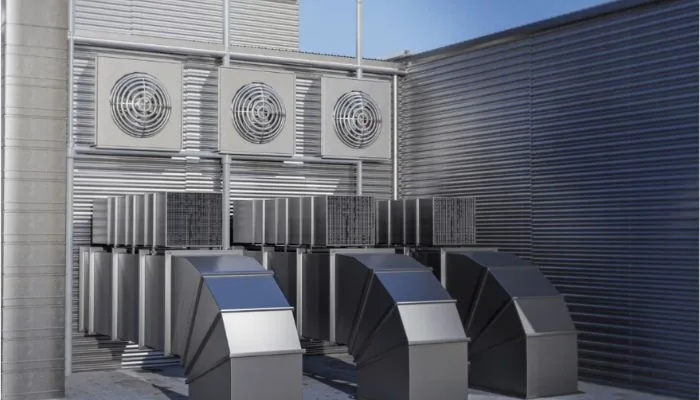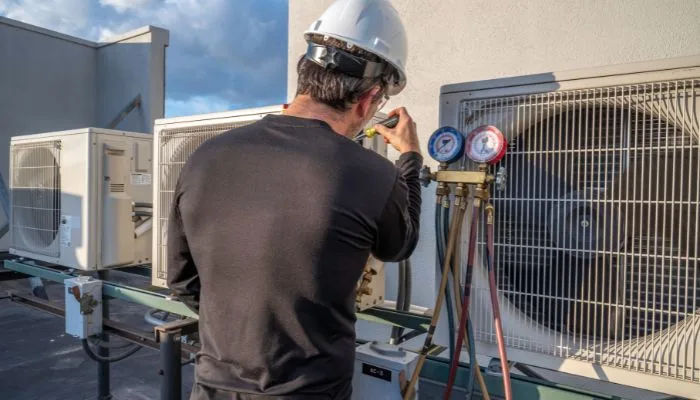HVAC (Heating, Ventilation, and Air Conditioning) systems that are energy efficient are designed to use less energy while providing ideal indoor comfort. These systems employ cutting-edge technologies and tactics to reduce energy usage, operating costs, and environmental effects.
Read: What is HVAC Engineering?
The following are some major characteristics and components of energy-efficient HVAC systems:
Table of Contents
High-Efficiency Equipment
High-efficiency equipment, such as condensing boilers, variable-speed compressors, and energy-efficient heat pumps, is used in energy-efficient HVAC systems. These components convert a greater proportion of energy input into useful heating or cooling output, reducing wasted energy.
Smart Thermostats and Controls
Smart thermostats and sophisticated control systems are essential components of energy-efficient HVAC systems. These systems adjust heating and cooling depending on real-time conditions, occupancy patterns, and user preferences using sensors and algorithms. They enable accurate temperature control and can automatically modify settings to reduce needless energy consumption.
Zoning and Occupancy Sensors
Zoning systems separate a structure into distinct areas or zones, each with its temperature control. Occupancy sensors detect the presence of occupants in certain zones and automatically alter the HVAC settings. By heating or cooling, only the areas that are actively in use, zoning, and occupancy-based control reduce energy waste.
Heat Recovery Ventilation (HRV) and Energy Recovery Ventilation (ERV)
HRV and ERV systems recover and transmit heat or coolness from exhaust air to incoming fresh air. This method minimizes the amount of energy necessary to condition fresh air, increasing ventilation efficiency without sacrificing indoor comfort.
Variable Refrigerant Flow (VRF) Systems
Variable-speed compressors precisely control refrigerant flow to specific indoor units in VRF systems, which are highly energy-efficient HVAC solutions. This technology enables simultaneous heating and cooling in separate zones, hence optimizing energy use.
Energy-Efficient Fans and Pumps
High-efficiency fans and pumps consume less electricity while maintaining acceptable air circulation and water flow rates in energy-efficient HVAC systems. Variable-speed drives on fans and pumps improve control and save energy.
Building Envelope Improvements
HVAC systems that are energy efficient work in unison with a well-insulated and airtight building envelope. Proper insulation, high-performance windows, and air leak sealing all contribute to reducing heat gain or loss, decreasing the stress on the HVAC system.
Regular Maintenance and Tune-ups
Proper maintenance and regular tune-ups are required to keep HVAC systems running at full efficiency. Dirty filters, coils that are clogged, and other faults can reduce performance and increase energy use. Regular maintenance aids in the smooth and efficient operation of the system.
Use of Renewable Energy
HVAC systems that are energy efficient can be combined with renewable energy sources such as solar panels or geothermal heat pumps. Renewable energy integration decreases dependency on traditional energy sources even further and reduces carbon emissions.
Building Energy Management Systems (BEMS)
HVAC systems are integrated with other building systems such as lighting and occupancy sensors via EMS. BEMS optimizes building energy use by coordinating the functioning of numerous systems based on real-time data and user preferences.
How Does an HVAC System Work?
The three primary purposes of an HVAC system are interconnected, particularly when it comes to producing comfortable temperatures and appropriate indoor air quality. Even though your home’s heating and cooling system is frequently one of the most intricate and expensive, you will quickly notice when it breaks down. You should be familiar with the air return, filter, exhaust outlets, ducts, electrical elements, outdoor unit, compressor, coils, and blower, which are the nine components of your HVAC system.
Air Return
Your system’s air return catalyzes the ventilation cycle to begin. This return pulls air in, filters it, and then sends it into the primary system. A pro suggestion is to regularly dust your returns because dust and debris can readily collect on your filters.
Filter
The second section of the air return where the air is drawn through is your filter. Pro tip: To keep your system in top condition, change your filters frequently.
Exhaust Outlets
The exhaust outlets, where the exhaust produced by the heating system is discharged, are another component of your system. Pro tip: Every year, inspect your chimney flue or vent stack, and tune it up if required.
Ducts
Ducts are the channels in which the heated or cooled air passes through. Pro tip: To maintain everything in working order, get your ducts cleaned every two to five years.
Electrical Elements
Although it can be a little difficult, this area of your system frequently experiences issues initially. Check for a tripped breaker or dead batteries in your thermostat if something isn’t operating properly.
Outdoor Unit
When someone mentions your HVAC system, this is probably the component that comes to mind. The fan that moves air is housed in the outdoor unit. Keep vegetation and debris away from your unit as it can cause serious issues if plants are sucked into your fan.
Compressor
The compressor, which is a component of the outside unit, transforms the refrigerant from a gas to a liquid and delivers it to the coils. Check your compressor if something isn’t functioning properly. It frequently leads to numerous system failures.
Coils
Coils cool the air as it passes through with a little assistance from the refrigerant and is typically another component of the outdoor unit. Pro tip: yearly coil inspection. You might want to check your filter and/or refrigerant levels if they start to freeze.
Blower
Warm air is drawn into the main part of the unit by the blower. Pro tip: Your system will be more robust the more effectively this air goes through it.
What Is Included in An HVAC System?
- Heating, ventilation, and air conditioning, or HVAC as it is commonly abbreviated, are the three essential components of the complete system.
- A furnace or boiler is typically referred to as the heating element. If you’re using a forced air system, it also comprises ductwork or a pipe network for the fluid conveying the heat.
- The ventilation element can be forced or natural, and when it is forced, it frequently also serves to purify the air.
- As most of us are aware, air conditioning, which is the exact opposite of heating, is the third and final component of an HVAC system. Its primary goal is to expel the internal heat from the house.
What is the Difference Between HVAC and Air Conditioning?
Surprisingly, we get this question a lot. You may be wondering what precisely separates HVAC from air conditioning. The last part of HVAC is air conditioning, but the terms are frequently used interchangeably to refer to any type of heating or cooling appliance in a home. Think of HVAC as the umbrella word and air conditioning as a component of it.
The Role of HVAC Engineers in Construction Projects
HVAC (Heating, Ventilation, and Air Conditioning) engineers play a significant part in construction projects, giving their skills to ensure the effective design, installation, and operation of HVAC systems within buildings. From the early planning and design stages to the project’s completion and ongoing maintenance, their duties span several areas of the construction process. In construction projects, HVAC engineers play the following crucial roles:
Needs Assessment and Design Planning
HVAC engineers collaborate closely with building owners, architects, and other stakeholders to comprehend the precise heating, cooling, and ventilation needs of the structure. To create a thorough HVAC system design, they consider variables such as building size, occupancy, consumption patterns, climate, and energy efficiency targets.
System Design and Layout
HVAC engineers design intricate HVAC systems based on needs assessments, specifying the kinds of equipment, ductwork, vents, and other necessary components. They create floor layouts that make the best use of available space while maintaining effective and balanced airflow throughout the structure.
Energy Efficiency and Sustainability
In their designs, HVAC engineers put a high priority on sustainability and energy efficiency. They look for ways to use less energy, incorporate renewable energy sources, and choose equipment and refrigerants that are good for the environment.
Collaboration with Architects and Contractors
HVAC engineers work together with contractors, architects, and builders to design HVAC systems for buildings in a seamless manner. They make sure that the HVAC infrastructure is compatible with other building systems and that the right conditions are created for the positioning and accessibility of equipment.
Equipment Selection and Procurement
When choosing the best HVAC equipment for the project, HVAC engineers are involved. When selecting heating and cooling systems, ventilation fans, pumps, and controllers, they take into account elements including energy economy, performance, dependability, and maintenance needs.
Regulatory Compliance
HVAC engineers are knowledgeable about the standards, laws, and building requirements that apply to HVAC systems. They guarantee that the HVAC system’s design and installation adhere to all applicable local, state, and federal codes, as well as safety regulations.
Construction Oversight
HVAC engineers supervise the installation of HVAC systems during the construction process to guarantee adherence to the design guidelines and requirements. They work with contractors to arrange the installation and deal with any unanticipated difficulties that could occur.
System Testing and Commissioning
To ensure that the HVAC systems are operating properly and performing as intended, HVAC engineers thoroughly test and commission the systems. This involves calibrating controls, balancing airflow, and looking for any potential problems or inefficiencies.
Occupant Comfort and Indoor Air Quality
Indoor air quality and occupant comfort are given top priority by HVAC engineers. To provide a wholesome and cozy indoor environment, they design HVAC systems that offer continuous temperature control, humidity regulation, and effective air filtering.
Maintenance and Performance Monitoring
HVAC engineers contribute to continuing maintenance and performance evaluation of HVAC systems even after the construction is finished. To gradually increase efficiency, they could offer routine preventative maintenance programs, analyze system problems, and recommend improvements.
Ensuring that buildings have well-designed, dependable, and energy-efficient HVAC systems that satisfy the particular needs of the occupants, HVAC engineers are crucial team members in construction projects. By following building laws and standards, their experience helps to create indoor spaces that are cozy, sustainable, and healthful.
Pathway to Become an HVAC Engineer
An HVAC (Heating, Ventilation, and Air Conditioning) engineer often combines education, training, and real-world experience to become qualified. The following is a typical path to becoming an HVAC engineer:
Education
Get your high school diploma or the equivalent first. Concentrate on math, physics, and other science-related disciplines because they serve as the basis for studies in HVAC engineering.
Bachelor’s Degree
Consider pursuing a bachelor’s degree in Mechanical engineering or a comparable discipline. Some colleges and universities offer specialized mechanical engineering programs or emphasis in HVAC engineering. The degree gives students access to crucial theoretical information in topics like Fluid mechanics, heat transfer, thermodynamics, and HVAC system design.
Internships and Co-op Programs
Consider taking part in cooperative education courses or internships with construction or HVAC engineering firms while you are an undergraduate. You will gain useful insights into the sector and be able to forge important relationships thanks to this practical experience.
Licensing and Certification
A professional engineer (PE) license may be required, depending on your location. Depending on the nation and state, different exams, including the Fundamentals of Engineering (FE) and Professional Engineering (PE), must be passed after acquiring the necessary job experience.
Advanced Education (Optional)
Some HVAC engineers decide to seek higher education, such as a master’s or doctoral degree in mechanical engineering, to specialize in a specific field of HVAC engineering, or to work on research and development projects.
Continuous Learning
Being current with emerging technology and market trends is essential in the field of HVAC engineering, which is always changing. Attend conferences, workshops, and continuing education courses to expand your knowledge and abilities.
Entry-Level Positions
Once you’ve finished your studies and obtained the necessary licenses, look for entry-level jobs at HVAC engineering businesses, consulting firms, or construction organizations. Here, you’ll work on HVAC projects from the real world and acquire practical experience.
Professional Development
As your career develops, take advantage of possibilities for professional growth, such as earning certifications from associations like ASHRAE (American Society of Heating, Refrigerating, and Air-Conditioning Engineers) or LEED (Leadership in Energy and Environmental Design).
Specialization
Think about narrowing your focus to a particular branch of HVAC engineering, including sustainable design, energy modeling, or building automation. Increased employment opportunities and in-demand status as an industry authority can both be a result of specialization.
It’s essential to keep learning, adapting to new technologies, and looking for chances to contribute to creative and sustainable solutions in the field of heating, ventilation, and air conditioning throughout your career as an HVAC engineer.
Salary of an HVAC Engineer
- As you gain experience, your expected income as an HVAC engineer changes.
- HVAC engineers who are newly trained might make up to £20,000 per year.
- HVAC experts with experience can get up to £35,000.
- Self-employed HVAC engineers set their pay rates.
- Location, employer, and any overtime you may work all affect your hours and pay.
* Salaries have been collected from multiple industry sources
Conclusion
In conclusion, energy-efficient HVAC systems are a crucial component of sustainable and environmentally responsible building design. These systems offer numerous advantages, including reduced energy costs, lower environmental impact, enhanced indoor comfort, and improved indoor air quality. By incorporating advanced technologies, smart controls, and renewable energy sources, energy-efficient HVAC systems play a significant role in combating climate change and conserving valuable natural resources.
As the world continues to prioritize energy conservation and sustainability, the adoption of energy-efficient HVAC systems is becoming increasingly essential. From residential buildings to commercial complexes and industrial facilities, these systems contribute to creating healthier, more comfortable, and energy-efficient indoor environments. The ongoing development of cutting-edge HVAC technologies and innovative engineering practices will further advance the field, paving the way for a future where energy-efficient HVAC systems play a vital role in shaping a greener and more sustainable world.
FAQs
Energy-efficient HVAC systems are made to use as little energy as possible while still providing the best possible heating, cooling, and ventilation. Energy-efficient HVAC systems, as opposed to standard systems, use cutting-edge technologies like heat recovery ventilation, smart thermostats, and variable-speed compressors to reach better levels of efficiency. They put an emphasis on energy efficiency, minimize operating costs, and lessen environmental effects.
Energy-efficient HVAC systems may cost more to install initially than traditional systems, but they offer significant long-term cost benefits due to lower energy costs. Furthermore, numerous utilities and governmental organizations provide rebates and incentives for the installation of energy-efficient HVAC systems, which can reduce the initial outlay.
Energy-efficient HVAC systems utilize less energy, which lowers their carbon footprint and greenhouse gas emissions. These systems are extremely important in preventing climate change and promoting environmental sustainability since they use less electricity or natural gas for heating and cooling.
Yes, energy-saving HVAC units can enhance indoor air quality. They use cutting-edge air filtration techniques, like energy recovery ventilation and HEPA filters, to get rid of airborne contaminants and provide a steady supply of clean air. Better indoor air quality benefits building inhabitants’ health, productivity, and general well-being.
Depending on variables including regional energy costs, system size, and building usage patterns, an energy-efficient HVAC system’s payback period varies. Building owners frequently get a return on their initial investment in a few years thanks to energy savings. Consequently, the system keeps providing long-term financial savings and environmental advantages over the course of its useful life.



